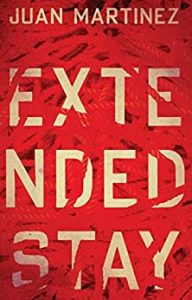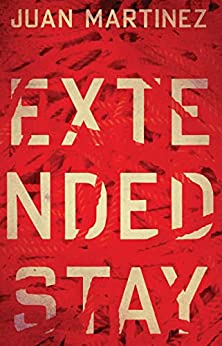Jake Casella Brookins Reviews Extended Stay by Juan Martinez
 Extended Stay, Juan Martinez (University of Arizona Press 978-0-81654-797-5, $19.95, 320pp, tp) January 2023. Cover by Leigh McDonald.
Extended Stay, Juan Martinez (University of Arizona Press 978-0-81654-797-5, $19.95, 320pp, tp) January 2023. Cover by Leigh McDonald.
I don’t know if “refreshing” is quite the right word to use for a book this horrifying, but it’s fascinating to see well-worn horror tropes remixed and reinvigorated this well. Juan Martinez’s Extended Stay is an excellent and unsettling riff on the haunted house – a genre that seems to be enjoying a renaissance in recent years, including, as you’ll see below, fascinating new work from Arkady Martine. Martinez draws heavily on body and cosmic horror, and his novel is shot through with intriguing stylistic flourishes and plangent social critique. Extended Stay is wonderfully speculative – not just in its supernatural elements, but in how it constantly takes the next step forward from its premises. Deeper in, and further afield.
Set mostly in Las Vegas, the novel centers on Alvaro and Carmen, teenage refugees from Colombia. After the rest of their family is killed, seemingly by mistake, in a grisly political execution, Alvaro flees with his younger sister, eventually winding up as a line cook at the dilapidated Hotel Alicia. Traumatized, with atrocities fresh in his mind, Alvaro finds himself drawn deeper and deeper into the workings of the Alicia – mysterious management and investment groups, catastrophic building issues, and increasingly unsettling disappearances and apparitions, revealing an ever-larger and ever-stranger presence beneath the hotel’s facade.
The Alicia feels like it’s built on (and of) many previous haunted buildings. The Overlook Hotel from King’s The Shining is a touchpoint, with its inscrutable mysteries and charactered compulsions (and occasional deluges of blood), and its shifting, menacing vastness calls to mind the more effective bits of Danielewski’s House of Leaves. Despite all the intense and outlandish horrors here – and there are many – it’s the small sensory details that really set the scene, and which have a very grounded feeling. I heard Martinez say on a panel once something to the effect that, once you own a home, you come to see how they’re all haunted. Alvaro, wrestling with his own demons, gets only partial glimpses of all the troubled history of the Alicia, and the little hints – rot in the walls, pipes giving way, even before things get really strange – have the kind of creep factor that brought me back to every aging house I’ve ever lived in, to flooded basements and things in the walls. That despair of realizing you’re in an object much bigger than you, that it might be unwell beyond healing, and that, yes, you might be trapped within it.
There’s a recurring idea throughout the novel of feeding the hotel, of sacrificing to it – one that called to mind, quite unexpectedly, Jhonen Vasquez’s Johnny the Homicidal Maniac, whose titular character must cover a wall in blood to keep a worse monster satiated. Here, that feeding very cleverly backlights the very real (and monstrous) themes of exploitative capital, of the precarity and prejudice immigrants often face, and the way these systems have of making us complicit:
Bargain with the hotel and you’d lose. You could give in or you could slip away. Listen to the hotel and you’d stay, you’d stay forever, you’d forget why you listened in the first place, what force kept you where you least wanted to be.
Which is not to say that the horrors of Extended Stay are merely metaphors; there’s exuberant riches of creepy ideas here, steadily more outlandish. Hallways overrun with insects, parent companies and investment groups that blur into hapless cultists, threats from beyond the void, and some really good body horror – none of it comes unmoored from Alvaro’s hopes and fears, and all that comes later is uneasily balanced against the deeply disturbing and upsettingly realistic violence in the opening chapter. Besides these discordant thematic resonances, Martinez also has a real knack for naming his worst terrors. By the time you’re introduced to the idea of “the Nightmare Room” or “the Face Beneath the Face,” you’re deep enough in to not really need to have them explained for them to work.
There are little touches throughout the novel that elevate it remarkably, including a masterfully spare sprinkling of metanarration – an explicit “I” telling the story to “you” that has the effect of pulling us in closer, rather than zooming out. Perhaps my favorite element of Extended Stay is how Martinez refuses to contain it, allows the story to grow beyond the bounds of a haunted house to something much larger. Too often, horror stories end by limiting themselves – monsters slain, the horrors of the world safely redefined as only existing in someone’s mind, and tending to climb to a sort of plateau of weirdness from which readers (and at least some characters) can safely descend. Here, there’s no plateau, or, to put it another way: there’s no bottom, it keeps going down.
Jake Casella Brookins is from the Pennsylvania Appalachians, and spent a fantastic amount of time in the woods. He studied biology, before switching over to philosophy & literature, at Mansfield University. He’s been a specialty coffee professional since 2006. He’s worn a lot of coffee hats. He worked in Upstate New York and Ontario for about 8 years. He’s been in Chicago since 2013; prior to the pandemic, he worked for Intelligentsia Coffee in the Loop. Starting in 2021, he’s been selling books at a local indie bookstore. He lives with his wife, Alison, and their dogs Tiptree & Jo, in Logan Square.
This review and more like it in the April 2023 issue of Locus.
 While you are here, please take a moment to support Locus with a one-time or recurring donation. We rely on reader donations to keep the magazine and site going, and would like to keep the site paywall free, but WE NEED YOUR FINANCIAL SUPPORT to continue quality coverage of the science fiction and fantasy field.
While you are here, please take a moment to support Locus with a one-time or recurring donation. We rely on reader donations to keep the magazine and site going, and would like to keep the site paywall free, but WE NEED YOUR FINANCIAL SUPPORT to continue quality coverage of the science fiction and fantasy field.
©Locus Magazine. Copyrighted material may not be republished without permission of LSFF.








